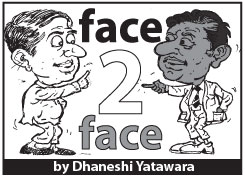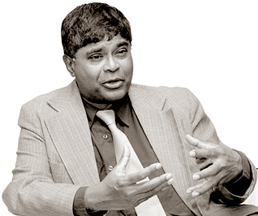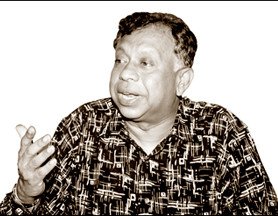Bouquets from professionals Brickbats from opposition
By Dhaneshi YATAWARA
[email protected]
 Protecting
Human Rights every time is an issue of controversy. Hence, it always
subjected to accords and disparities. However, liberty for expression
itself, is a basic human right. This time ‘Face 2 Face’ tries to view
the in situ situation of this essential human need from two different
perspectives. Protecting
Human Rights every time is an issue of controversy. Hence, it always
subjected to accords and disparities. However, liberty for expression
itself, is a basic human right. This time ‘Face 2 Face’ tries to view
the in situ situation of this essential human need from two different
perspectives.
What is your observation on safeguarding Human Rights in Sri
Lanka?
Prof. Rajiva Wijesinha - Secretary General, Secretariat for
Coordinating the Peace Process
Absolutely essential. Protecting Human rights is required to build
confidence among all, especially, the minorities and in the long run, it
supports the peace building process as well. Ensuring Human Rights is an
appropriate way to make the people feel they are getting equal
treatment. Wining the confidence of people is an essential aspect in
carrying out peace building process.

Prof. Rajiva Wijesinha - Secretary General, Secretariat for
Coordinating the Peace Process |

Dr. Jayalath Jayawardana UNP Assistant Secretary (Relief and
Services) Pix by: Kavindra Perera |
Dr. Jayalath Jayawardana UNP Assistant Secretary (Relief and
Services)
Safeguarding Human Rights in Sri Lanka is very low. I’m not satisfied
with the situation at all. Specially the implementation of international
treaties, the UN Convention, Children’s Charter etc. The present
Government has not taken necessary measures to give effect to such
treaties so as to protect Human Rights. Government has not taken serious
action to provide for them in our legal system.
How do you see Human Rights violations that seem to be threatening
the civil society in the recent years?
RW:
I think if we compare the present situation with that of some twenty
years ago things have improved much better. At the moment we have a
clearly independent judicial system. This was not the situation in the
‘80s.
There were some judges in the Supreme Court who said that since the
Government is elected by the people the Government should not be brought
before courts. It is not the case now. At times the judiciary puts the
Government at a, test. And also there should be an understanding on the
limits of others freedom particularly the relevant parties.
JJ:
Especially after 2005 there has been an escalation of violence,
Missing in Action, extra judicial killings etc. And especially with
regard to the Tamil people from the North and the East who were in
Colombo and later who were sent back to Vavuniya. Fundamental rights of
citizens must be protected.
As a responsible Opposition we have been warning the Government on
these Human Rights Violations. And we see suppression of the media. We
have seen 12 media personnel being killed during this short period of
time.
So we see that the situation has turned from bad to worse. It is
difficult to hide things from the world. With hi-technology even the
minute thing that happens here will be known by the whole world in
seconds.
What are your comments on the concerns expressed by the
international community over the Human Rights issues in Sri Lanka?
RW:
One thing we must get clear is that the international community on
the whole, has been very positive. There is a certain tendency for the
English speaking people of our country to feel that the international
community is only the West.
But if we take the recently published Universal Periodical Review on
Human Rights of Sri Lanka, 56 countries spoke and well over half of the
countries participated were very positive over the Human Rights
situation in Sri Lanka, as a whole.
Even if we take the UN Convention on Human Rights it is not only
political rights that we are concerned with but economical rights,
social rights as well. Some of the countries really recognized the
Government’s effort in providing social facilities even to the people in
the uncleared areas.
The Government manages to do that even at a state of war. But the
Secretariat in Geneva tended to stress the people who were critical
about the political rights. I think, the record that is there is quite
positive about our general achievements while drawing attention to few
certain issues.
JJ:
We are really worried. The goodwill and the image of Sri Lanka has
been tarnished. We are worried about what the international community is
adding.
What will be the results? Foreign Governments, Foreign Organisations
etc who are helping Sri Lanka by providing different types of assistance
will question us. We do not know what will happen to the GSP plus.
If we loose, over 300,000 people will also loose their jobs directly.
Our loosing the Seat at the UN Human Rights Council is a great setback.
We had the membership and we were enjoying it. But we see that the
Government is not taking it as a setback. But we do not see any good
results.
What is your assessment on the measures adopted in Sri Lanka with
regard to the stability of Human Rights?
RW:
Well we have the Human Rights Commission and as I see it, those
people who are accusing that the HRC is inadequate are really not
assisting us to fully perform.
One of the incidents where I find insincerity is when the UNDP
recommended assistance to the HRC some years back their people in
Colombo did not take necessary steps just because they wanted to
criticize the HRC.
The excuse we have heard that is given by the then Colombo UNDP is
that they did not have funds, which was false, later I was informed. And
we need to give an efficient training for the personnel involved in
protecting law and order.
For example, for freshly recruited young men to the police service
must be given practical training on Human Rights protection. They must
know what the practical problems they would face during their work. They
must feel their responsibilities rather than just knowing.
JJ:
There are no steps taken by the Government with regard to the
stability of Human Rights. The Inter Parliamentary Union (IPU) has
issued a statement that the lives of ten Members of Parliament of Sri
Lanka are under threat. And ten other cases of Sri Lankan MPs are under
consideration at the IPU.
The Union cannot be influenced by outside sources. Members of
Parliament are those voted to office by the people. The Government
should understand the gravity of the problem. During our regime we were
able to protect our seat at the Human Rights Council. After November 17,
2005 the situation has turned worse.
How do you compare Sri Lanka with regard to the protection of
Human Rights with other communities in the region and internationally at
large?
RW:
Each country has different issues. But to my view, I see that most of
the countries are positive towards our stability in Human Rights
protection. Especially see how the social and economic rights are
protected. In education for women, we are far higher than many of our
neighbouring countries.
JJ:
We can compare but what is important is our credibility and our
position. Attributing all the blame to the existing war, is not a
justification. Irresponsible action will bring discredit to Sri Lanka. I
myself went through an injustice when there were threats to life from
extremist groups.
What sort of assistance Sri Lanka should obtain over the
protection of Human Rights from the international community?
RW:
International assistance is alright but not intervention. We must
seek what we really need. Especially to strengthen the process within
the country. We must give a very professional training for the people or
officers belonging to the relevant institutes.
If people are not professionally trained there is a tendency for them
to get violent during executing their responsibilities. The officers who
have to come across issues related to Human Rights need to know more on
prosecution and intimidation to tactfully handle situations.
JJ:
First of all Sri Lanka should listen to the international community.
And Sri Lanka should follow international protocols and conventions
signed by the Government. Then Sri Lanka should show the genuine
commitment to protect Human Rights. I strongly feel that the present
Government should take immediate steps to implement the 17th Amendment
in order to protect the Human Rights.
The 17th Amendment is the law of the country. The MPs and the
President have given oaths to protect the Constitution of the country.
The International Community is at constant watch. If the Government does
not protect Human Rights, they will be indirectly inviting the
International community to intervene.
It is for the past two decades the terrorism remains a big
challenge to the unity and integrity of our country. Therefore when the
measures are in place to tackle terrorism militarily how best the Human
Rights could be protected?
RW:
The Security Forces, particularly the Army, has an excellent training
in protecting Human Rights. Their current records are quite outstanding.
Accusations on child soldiers is of the LTTE. The Government is trying
their best to release these children. Civilians getting killed in
crossfires in the FDLs are very minimal.
We know that there are abductions of civilians and the Government has
taken steps to inquire in to these. And of course we know that there are
conflicts between the LTTE and other paramilitary groups which
contribute to certain extent to these factors. But in recent times these
have been reduced to a greater extent.
JJ:
This war existed for the past twenty years. This war did not start
after November 2005. All the previous governments had to protect the
territorial integrity of Sri Lanka.
Our position is that the territorial integrity and sovereignty of Sri
Lanka should not be challenged. Sri Lanka is one country. We will not
allow anybody, whatever the force, to divide this country. But, the mere
fact that we are fighting terrorism cannot justify the violations of
human rights.
What are the measures must be taken to stabilize and enhance the
stability of Human Rights in Sri Lanka?
RW:
And as and when the Government comes across any allegation against
any official they must be prosecuted. What’s wrong with us is that we
wait till we get 99% evidence. That is not needed. Let the courts
decide. The relevant Government officials should take these steps when
necessary.
Hence, the message is conveyed to the others that such acts are not
acceptable. Many cases of human rights violations, as I see, are against
the Police. May be because it is their nature of their job. They come
across people more often than any other security forces. Therefore they
should be given a very professional training on securing Human Rights
and related issues such as prosecution.
They must feel their responsibilities and not just mere knowledge
about it. I highly appreciate the steps taken by the Police to solve the
language problem. And their training should continue periodically. It is
a must. These officers must know to use the formula when tackling HR
related issues.
JJ:
As I said earlier, the Government has to be genuine. The Government
should fully implement the International conventions Sri Lanka have
signed. The Human Rights Commission must be strengthened and not made to
act as a mere puppet. A classic example is my case! The Government
overlooked their revelations on my human right violations when I had
life threats from extremist groups.
There are many cases like that. The Government should strengthen the
Parliament. The Government should take immediate steps to implement the
Constitutional Council under the 17th Amendment and also implement the
independent Police Commission, Independent Election Commission and
Independent Public Service Commission.
Do we have adequate legal measures with regard to the stability of
Human Rights in the island?
RW:
The legal provisions are certainly there. That is one reason why
violators of human rights can benefit more. That is why the Government
should prosecute the violators of human rights without waiting for full
evidence to proof. Proving and convicting is the responsibility of the
courts.
It is the government’s responsibility to bring the violators before
law. Because that sends the message to other violators that the
government totally disapproves such actions.
JJ:
Well, I should say we do not have. That is why the Government should
take steps to enact the International treaties. Most of the countries
who have signed these treaties have integrated them into their legal
systems. The legal system has to be further strengthened and there
should be an independent judicial system.
|
